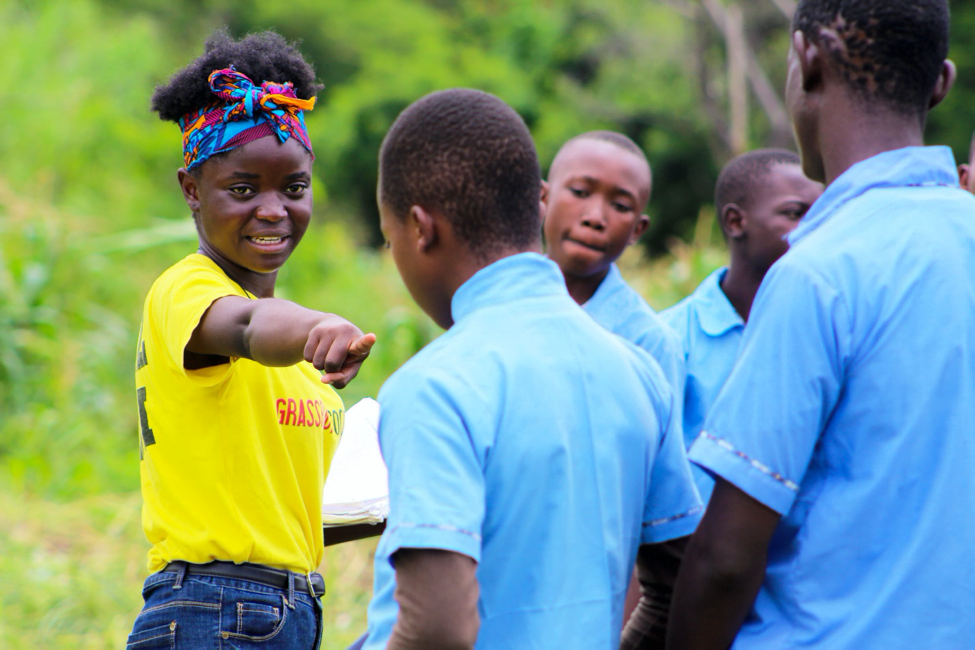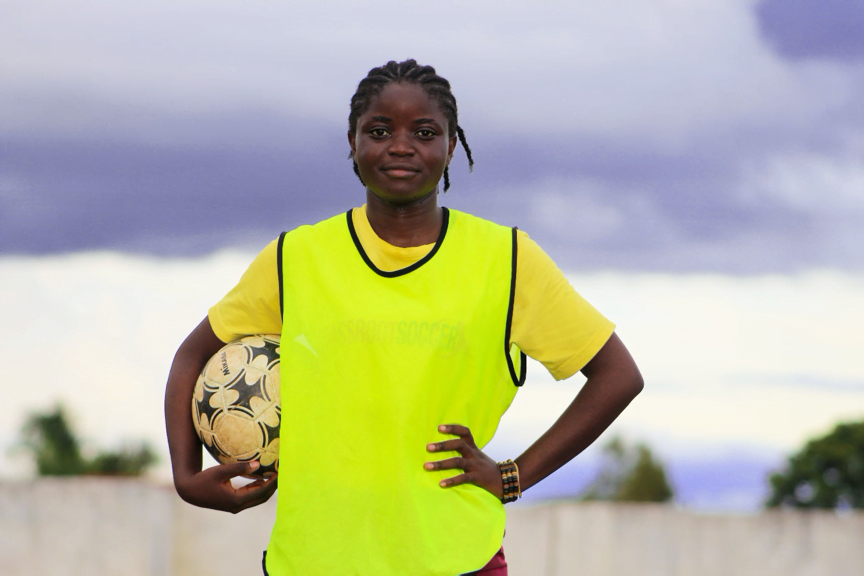Girls with Dreams, Women with Vision: An International Women’s Day Address

The following was written by Grassroot Soccer (GRS) Zambia Coach Kunda Mwitwa. International Women’s Day is a global day celebrating the social, economic, cultural and political achievements of women, and is celebrated March 8. The 2020 theme is #EachforEqual, marking a call to action for accelerating women’s equality.

Growing up as a girl in Zambia has brought its fair share of experiences. When I was much younger I recall having both boys and girls as my friends and playing with them whenever I wanted. I also had a boy cousin who lived with us. It was from my cousin’s interactions that I noticed we were treated differently. “Don’t run around the house!” My mother would scream “Uleumfwa! Amano kwati kaume!” (“You should behave well and not like a boy!”) This statement in itself didn’t have much meaning until I completed secondary school.
The differences became more profound in my late teens, when I noticed that boys at my school would participate in more activities as compared to the girls. I remember the school grounds were always occupied by the boys who were very free to play different types of sports; they would play football at this time and play another sport at another time. But this could never be said about us, we were often left to play after the boys had finished their games or would be coaxed to cheer them as they played. What was even more surprising was that although my school at senior secondary had more girls than boys – maybe about 65% were girls – during Olympiads’ competition [editor’s note: Olympiads are competitive and selective academic competitions] only one girl would be selected to be part of the team. That one girl would only focus on biology, and not traditionally male-dominated subjects like physics or mathematics, even though there were more than a few girls at the top of those classes.
It wasn’t until I completed school that I started realizing the society I grew up in already set expectations for me and other girls in my community. It now clicked that it was more inclined to view boys and men as high achievers as opposed to girls and women, and hence girls received less opportunities or, in my personal experience, slots in Olympiads.
I wanted to be different and I always tried to participate in the male-dominated areas like soccer. In late 2016 I was a GRS participant. During one intervention I was given the opportunity to do what is called a teach-back. I led my fellow peers in a practice themed communicate. It was at this point when I began to realize that communication plays a very cardinal role in regards to gender equality: Males and females need to communicate for them to understand each other, and if we mastered that we would have moved a step further towards achieving gender equality. In early 2017, GRS identified me as a young changemaker. GRS is one of the leading organizations in teaching young people about sexual reproductive health and rights, and it’s also aimed at ensuring that girls like myself are aware about gender equality. As a youth I did not have the opportunity to learn about gender equality, but through GRS linkages I am able to say that they have provided a platform for girls in different communities to not only participate in advocacy work but also in sports activities.
Just two weeks ago, GRS Zambia challenged the American Embassy in a social football match played at Queens Mead grounds in Lusaka. I am proud to say that I was among the few females given a chance to play against a team of males. That in itself shows how GRS recognizes the importance of uplifting its female Coaches, because we in return have to uplift the young adolescent girls that we teach. GRS curriculum is aimed at educating not only girls but also boys on the importance of gender equality. Earlier today I was with a group of young adolescent boys and girls, teaching them the importance of treating each other as equals regardless of gender; imbalanced gender expectations impact not only our communities, but the country at large.

Females need a seat at the table. We desire an invitation to be seated there and, in some cases when this isn’t available, you know what? We need to learn to create our own table. Because I believe girls with dreams can become women with vision. May we proudly support and empower each other to carry out our vision, because it is not enough to simply just talk about equality. It isn’t enough to simply believe in it. One must work at it. Let us work at it together. Gender equality, besides being a fundamental human right, is essential to achieve peaceful societies with full human potential and sustainable development. Women and girls represent half of the world’s population and, therefore, half of its potential. In working towards equality, women and girls must view men and boys as partners, not competitors, because our shared relationships are at the core of equality; transforming these relationships requires the involvement of us all.

